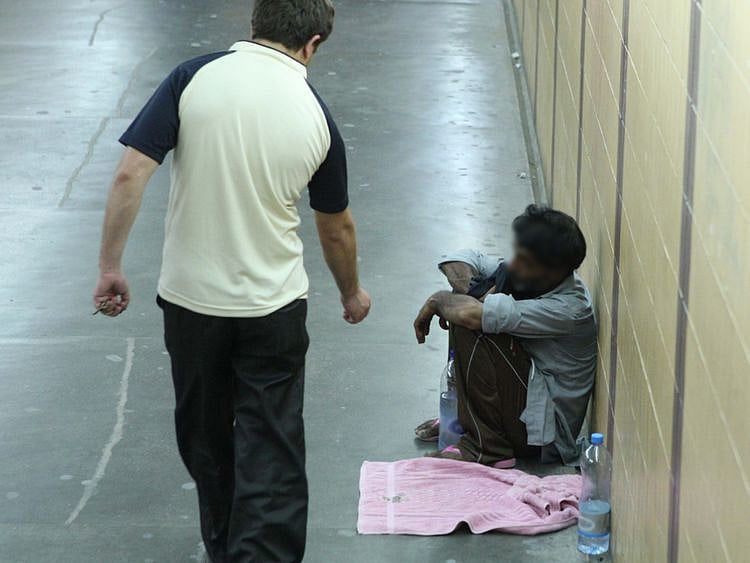Coronavirus flight suspensions stop Ramadan begging syndicates from descending on UAE
Around 60 per cent of those arrested for begging in 2018 were on visit visas, say police

Dubai: UAE authorities have one less thing to worry about this Ramadan – beggars from overseas.
Every year, planeloads of professional beggars would descend on the UAE to cash in on the spirit of giving during Ramadan. But COVID-19 flight restrictions have put paid to their plans this year, leaving the police to contend with just residential beggars.
As many as 164 beggars and 78 door to door salesmen have been nabbed in Dubai since the start of Ramadan. The arrests have been made under the city’s annual anti-begging campaign which sees heightened patrolling during the Holy Month.
242
Beggars including 21 women have so far been arrested in Dubai this Ramadan
People familiar with the begging racket said it’s unlikely that any of those arrested had come from abroad for the purpose of begging as the UAE had suspended all passenger flights in March to contain the spread of the coronavirus pandemic.
Multi-million dollar industry
A travel agent in Mumbai, India, said the beggars typically air-dash to Gulf counties in the first week of Ramadan. “That’s when the multi-million dirham begging industry goes into overdrive and hundreds of career beggars go to places like the UAE on month-long visit visas posing as tourists. But this time they didn’t get the chance,” said M.A. who requested to be identified by just his initials.
The trips don’t come cheap. Investigations made by Gulf News show seasonal beggars pay agents up to Dh4,000 to arrange these visits during Ramadan.
Linked to criminal syndicates, the agents not only arrange air tickets and visas but also accommodation. At times they even plan the itinerary - right from designating the spots where a beggar has to be deployed and for how long.
Travel firms face fines
Around 60 per cent of those arrested for begging in Dubai in 2018 carried visit visas, according to Dubai Police. Travel firms face a Dh2,000 fine if anyone on their visa is caught begging. If the numbers are sizeable, the firm could be blacklisted.
Two years ago, the Federal National Council backed a draft law to punish people running begging syndicates. The legislation includes a minimum jail term of six months and a fine of at least Dh100,000. Individual beggars can be imprisoned for three months and fined Dh5,000.
In the absence of tourist beggars, some destitute UAE residents are also exploiting charitable sentiments this Ramadan.
Major-General Saif Al Zari Al Shamsi, Commander-in-Chief of the Sharjah Police said beggars have scaled up their operations in wake of the coronavirus situation. An Arab woman said she was approached by a bedraggled looking man in a sandy car park near her house in Sharjah’s Al Majaz 3 neighbourhood on Friday.
“I was about to turn on the ignition when a young Asian man tapped the car window. He appeared to be nursing an infected wound. I hurriedly dug into my purse, gave him some money and drove away,” she said.
In Satwa, Dubai, another resident, Mohammmad Shahid, recalled being accosted by a beggar who pulled open his shirt to reveal an intravenous (IV) bag taped to his abdomen. “He said he’s sick and asked for money,” said Shahid.
Police said people should not believe these sob stories no matter how convincing they sound.
Beggars have been caught faking disabilities and illnesses with prosthetic legs and IV bags. In one instance, when the police checked the IV bag’s contents it turned out to be an ordinary yellow liquid.
Last year, police arrested a man in Al Quoz who had collected Dh100,000 from unsuspecting donors in a single month. But that was still short of the Dh184,000 a woman made in just over two weeks after projecting herself on social media as a victim of a failed marriage.
Begging is outlawed in the UAE. Residents are urged to report alms-seekers to authorities and instead give money to authorised charities.
Colonel Ali Salem, Director of the Infiltrators Department at Dubai Police, said people can notify authorities by calling 901 or reporting the incident on the Police Eye app. Online begging scams can be reported on the Dubai Police website, he said.
Anti-begging campaigns have been rolled out in Shajrah and Ras Al Khaimah as well.
The message is clear: Beware of the tug at your heart strings; it’s your purse strings that are being tugged.
901
Is the number you need to dial to report any begging activity
Network Links
GN StoreDownload our app
© Al Nisr Publishing LLC 2026. All rights reserved.